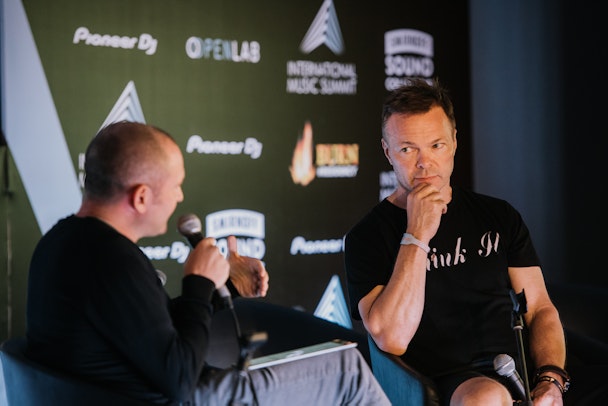Pete Tong talks music innovation: 'I wouldn’t let AI make creative decisions for me'
DJ and Radio One presenter Pete Tong has his finger firmly on the pulse of the music industry, most recently sitting as a judge on the Burn Residency event at the Ibiza Music Summit (IMS) where he looked to find, educate and champion the next generation of artists.

Pete Tong at Burn Residency event at the Ibiza Music Summit (IMS)
Speaking to The Drum, during the seventh year of the global DJ competition, sponsored by energy drink brand, Burn, Tong talked through the innovations shaping the industry, how Spotify and similar services can integrate with good radio, how to best utilise data, streaming payment issues and more.
Very much a curator and creator, the idea of using artificial intelligence (AI) to produce songs and automated playlists does not quite sit right with Tong. As consumer listening habits become digitised, it is becoming easier than ever before to inform creators how music is being consumed.
On the whole this can be used to guide AIs in the production of original songs. Sony is among the companies currently experimenting with AI compositions: Daddy’s Car, a melody combining numerous Beatles songs, is a predominant example.
On this, Tong said: “From a geeky point of view I find it interesting if the data tells me all the most popular songs are written with these three most popular chords. What I want to do with that is try and use that data in a creative way, maybe put them in an order it has never been used before.
“I wouldn’t let the AI make creative decisions for me,” he distinguished.
As a radio host, there is data that can be implemented in his decision making process. Sometimes it can help flag a hit early, and it can also help benchmark the extent of his influence, however nothing can replace the gut feeling and experience from being at the top of the game for decades, Tong argues.
“If it can flag stuff I wouldn’t see or [do so] quicker, then I’ll use it – I’m always looking at data to see what I can get out of it – but I don’t need it to tell me the most popular song and then just play that."
"I would not let it do the job for me, because that’s not what I do," he added.
But it is data that is driving the market leaders in streaming. While the dominant position of Spotify is often linked to the steady decline of radio listeners, Tong takes a less binary position on this dynamic.
“Radio is still unique from Spotify, Spotify - and Apple Music - are brilliant services, as long as they put people onto me and my radio show," he said. "I am just looking for more platforms to push on. I’m listening to music and making choices every day on my shows – if they can be enhanced and magnified by these services it ticks my boxes and is consistent with what I am doing.
“If I champion a record on radio and I can do that on Spotify or another [platform] I will, putting my message out further and further,” he added: “People can get turned onto radio shows because they are big on Spotify, it is great, but there are still limits via the computerised playlist – it is a vast library that you can get lost in.”
On the whole, one of the major headline points in the industry is the payment of artists. For a while, Taylor Swift, one of the industry's best paid artists, took a stand against Spotify and made the move to Apple Music.
On top of this, Tidal, the supposed platform by artists, for artists, invoked criticism for putting out a meandering 'fairer payment' mantra.
On the payment front, “things will work themselves out in the end,” Tong believes. “A lot of people get vociferous about all the rights issues but a lot of those people would be better off making better records. There’s not enough brilliant records in the industry today.
“Most of the effort should go into the craft, making the best music. There’s more places than ever to get started, it is not like the gates are locked. You can be as experimental as you like ... If you are worried about getting paid by these services then your music probably isn’t good or big enough.
When income is short, artists have the option of embracing brand partnerships. Some work, some really don’t. On what makes these relationships click, Tong said: “Brand partners are right when the brand can enable something to happen that would have been available otherwise. [If it's] a better experience for the artists or the consumer, then it is a worthwhile event.
"It’s not enough to hang a couple banners around the stage and write a check. It may underwrite the price of a show but it doesn’t add anything. They have to make something happen. A brand creating its own market and magic.”

